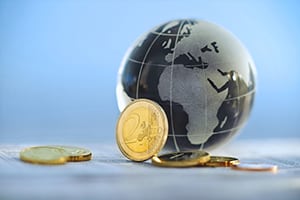Currency exchange rate fluctuations are likely to bolster the global economy as countries start to see their growth paths diverge, says the International Monetary Fund.
The IMF expects countries with weaker currencies improve their growth as exports become cheaper and more attractive to foreign buyers, boosting sales for manufacturers and service providers.
In a regular update to world economic growth forecasts, the IMF expected little to change globally as underlying economic trends in different countries balanced out their rises and falls in growth.
The Eurozone and Japan are expected to benefit most, as both are implementing programs of quantitative easing while experiencing currency devaluation against the US dollar and Pound.
Publishing the report World Economic Outlook, the IMF expects global growth to remain at 3.5% this year.
However, next year’s figure was upgraded by 0.1% to 3.8%.
Strong US dollar
IMF economists cited volatile currency exchange rates and lower oil prices as the factors affecting the revised figure, rather than any major economic changes.
Currency movements against the strengthening dollar are the major concern of economic policymakers, who are due to meet at the IMF this week.
The dollar has risen rapidly against the euro and yen and also seen a gap open with some emerging market currencies.
While the strong dollar has damaged imports into the States, the IMF also points out that US exports have also fallen by 10% as foreign customers are finding them too expensive.
“The shift in our thinking is spurred by two main factors,” said an IMF spokesman.
China crisis
“Some developed economies have recovered more quickly than anticipated – with growth jumping from 1.8% to 2.4%. However, this is tempered by a corresponding fall in growth for emerging economies.
“They have seen growth drop from 4.6% to 4.3%. This uneven growth is keeping global growth at a near standstill as one economy rises and another falls.”
The IMF is also concerned about growth in Russia and China.
The prediction for Russia is growth to fall back 3.8% this year and 1.1% next year due to economic sanctions and over reliance on falling oil prices.
“We feel other factors are at work in the Russian economy that need resolution as well,” said the spokesman. “The problems go beyond issues with the rouble and a drop in oil and gas prices.”
Meanwhile, China has posted GDP figures of 7.4% for 2014 – the lowest growth for 25 years.
